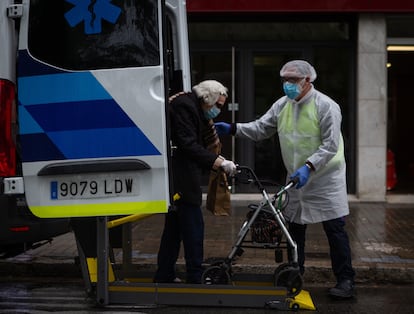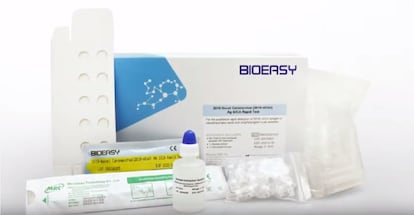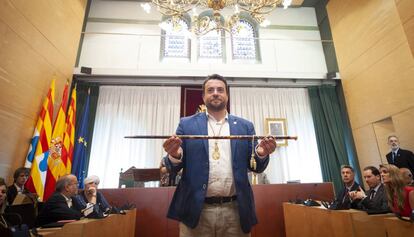Coronavirus deaths in Spain stabilize: 435 in the past 24 hours
Although there was a rise in new cases and daily fatalities, the infection rate has remained steady at 2%

The number of daily coronavirus deaths registered in Spain was 435 on Wednesday, according to the latest figures supplied by the Health Ministry. This is a slight rise from yesterday’s figure of 430.
There has also been a slight rise in the number of new cases. In the past 24 hours, there were 4,211 registered infections, compared to 3,968 on Tuesday. This is a rise of 2% of the total, which is in keeping with the trend over the past five days.
Since the beginning of the crisis, 41.2% of confirmed coronavirus patients have recovered from the disease, a figure that has been steadily rising
There have been a total of 21,717 official Covid-19-related fatalities since the pandemic hit Spain, with confirmed infections now reaching 208,389. Some 85,915 patients have recovered from the illness and have been discharged from hospital.
There was a significant increase in the number of patients discharged from hospital, with 4.1% of the total recovering, compared to 2.4% on Tuesday. Since the beginning of the crisis, 41.2% of confirmed coronavirus cases have recovered from the disease, a figure that has been steadily rising.
It should be noted that there are variations in the official statistics this week given that the Health Ministry is updating the historical series, after the government issued an order to the 17 regions in a bid to homogenize the different reporting of the data.
Speaking at the government’s daily press conference, Fernando Simón, the director of the Health Ministry’s Coordination Center for Health Alerts, said the figures showed “very favorable progress [of the outbreak] with respect to last week.” “We have maintained [daily fatalities] in the range of 400 cases,” he explained.
Simón attributed the rise in cases to increased testing, adding: “We all knowci that there has been an important drop in transmission. We have to guarantee it and verify it. In the meantime, we have to maintain control over situations of risk.”
After reaching a peak of 950 fatalities on April 2, the number of daily coronavirus-related deaths began a slow descent. The figures last week, however, plateaued, with 410 on Sunday, 565 on Saturday, 585 on Friday, 551 on Thursday and 523 on Wednesday.
Spanish PM calls on Congress to extend state of alarm
Spanish Prime Minister Pedro Sánchez appeared in Spain’s lower house of parliament, the Congress of Deputies, on Wednesday to seek approval to extend the current state of alarm until May 9. Sánchez leads a minority coalition government between the Socialist Party (PSOE) and junior partner Unidas Podemos. Given the lack of a working majority, the prime minister needs the support of other groups in order to pass legislation.
“We are living in a time of extraordinary sacrifices,” Sánchez told Congress during the start of the debate on Wednesday morning. “We cannot let our guard down.”
The prime minister added that the relaxation of the confinement measures after May 9 will be “slow and gradual.”
Pablo Casado, the leader of the Popular Party (PP), indicated in Congress that his party would support the extension, but accused the government of “incompetence” and “improvisation” in its handling of the crisis. Ciudadanos (Citizens) is also likely to support the measure, while the Catalan pro-independence party Junts per Catalunya and far-right Vox, which is the third-largest party in Congress, have said they will vote against it.
The state of alarm was approved by the Spanish Cabinet on March 14 and came into effect the following day. It was set to last until March 29 but has already been extended twice by Congress until April 26.
Government spending on medical supplies
The Spanish government has spent at least €350.3 million on medical supplies, according to documents released by the Cabinet on Tuesday. This marked the first time the Health Ministry had publicly reported how much it has spent on these products. The information covers seven agreements for the purchase of different kinds of face masks, gloves, protective glasses, as well as diagnostic tests.

One of the agreements is for the 640,000 antigen tests that were found to be defective and were sent back by the Health Ministry. According to the information supplied on Tuesday, the government spent €17 million on 659,000 diagnostic tests from the Chinese company Shenzen Bioeasy Biotechnology, or the equivalent of €26 per test. As EL PAÍS revealed on Tuesday, the government is seeking a refund for the faulty products, for which it made a €6 million advance payment. The distributor of the tests, Interpharma, issued a press release on Tuesday stating that the €6 million had been paid back.
The Spanish government also spent €38.7 million on more than five million diagnostic tests, the equivalent of €7.70 per test. Given the size of the shipment, it is likely that they are the five million serological and antibody tests that most regions are using in conjunction with PCR tests, which are the most reliable.
According to the information, the Health Ministry paid nearly €251 million on 488 million face masks, or €0.51 per unit.
Mayor breaks confinement measures

The mayor of the Catalan city of Badalona, Álex Pastor has resigned from his position after being arrested on Tuesday night for breaking the lockdown rules. According to police sources, the Socialist politician was driving in his car and showed evident signs of inebriation, but refused to take a breath test. “He was very upset, yelling and hitting things,” they said. “He could not stop repeating: ‘I’m the mayor of Badalona’.” According to these sources, Pastor even bit one of the Catalan regional police officers at the scene. The Catalan branch of the Socialist Party (PSC) immediately demanded his resignation and suspension from the party.
Emergency morgue in ice rink closes
The emergency morgue in Madrid’s Palacio de Hielo ice rink will close on Wednesday due to the fall in coronavirus deaths. The ice rink, which is located inside a shopping mall in the north of the city, was the first facility to be turned into a temporary morgue in a bid to ease the situation in the region’s hospitals and funeral services. Another ice rink in the western municipality of Majadahonda and a facility inside a failed development project called the City of Justice were also turned into makeshift morgues. Since becoming operational, the Palacio de Hielo ice rink has housed 1,146 victims.
Government sets face mask price
The government has set the maximum price of a surgical face mask at €0.96, according to Health Minister Salvador Illa. At a press conference on Tuesday, following the weekly Cabinet meeting, Illa explained that the price had been reached after consulting with the Interministerial Commission on Medicine Prices and will come into effect on Sunday once the decree is finalized.
The measure seeks to end price gouging of face masks, which have seen a dramatic rise in cost due to the coronavirus crisis. The government, however has not set any price on other medical supplies such as hand sanitizer and gloves.
English version by Melissa Kitson.
Tu suscripción se está usando en otro dispositivo
¿Quieres añadir otro usuario a tu suscripción?
Si continúas leyendo en este dispositivo, no se podrá leer en el otro.
FlechaTu suscripción se está usando en otro dispositivo y solo puedes acceder a EL PAÍS desde un dispositivo a la vez.
Si quieres compartir tu cuenta, cambia tu suscripción a la modalidad Premium, así podrás añadir otro usuario. Cada uno accederá con su propia cuenta de email, lo que os permitirá personalizar vuestra experiencia en EL PAÍS.
¿Tienes una suscripción de empresa? Accede aquí para contratar más cuentas.
En el caso de no saber quién está usando tu cuenta, te recomendamos cambiar tu contraseña aquí.
Si decides continuar compartiendo tu cuenta, este mensaje se mostrará en tu dispositivo y en el de la otra persona que está usando tu cuenta de forma indefinida, afectando a tu experiencia de lectura. Puedes consultar aquí los términos y condiciones de la suscripción digital.








































